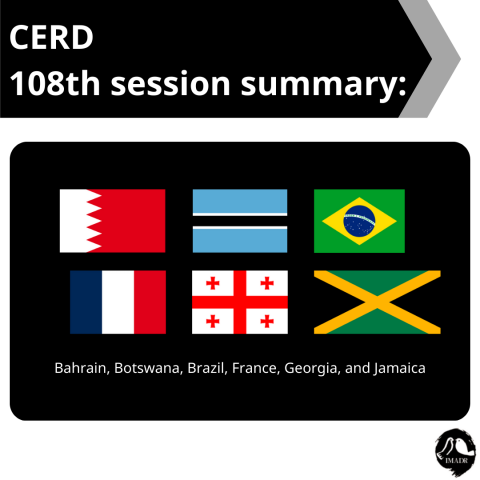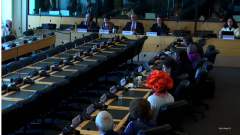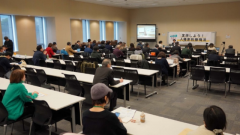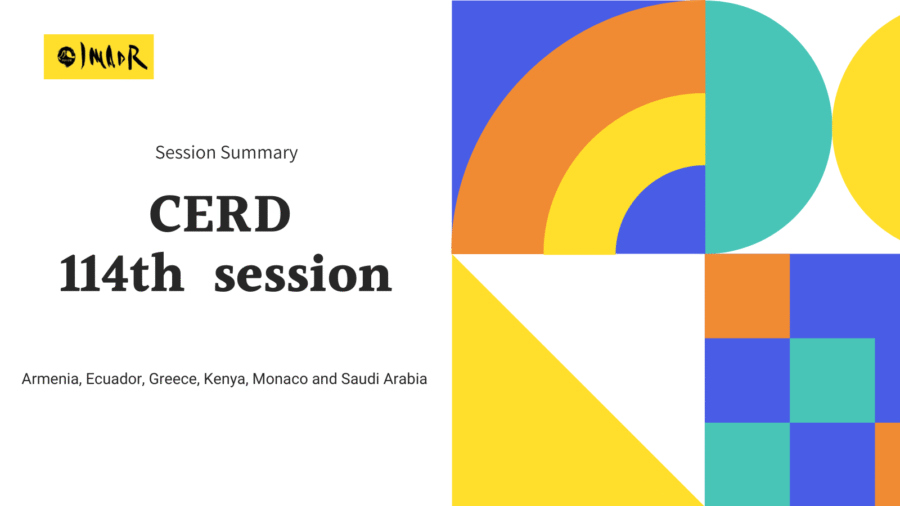CERD 108th session summary: Bahrain, Botswana, Brazil, France, Georgia, and Jamaica
December 20, 2022

From 14 November to 2 December 2022, the UN Committee on the Elimination of Racial Discrimination (CERD) held its 108th session.
In this session, the Committee reviewed and adopted concluding observations on Bahrain, Botswana, Brazil, France, Georgia, and Jamaica. Additionally, the Committee examined two follow-up reports submitted by the Netherlands and Slovakia.
Under its Early Warning and Urgent Action procedure, the Committee sent a letter to China in relation to the reports of human rights violations in the Xinjiang Uyghur Autonomous Region of China (XUAR). It urged the Government to investigate the complaints of human rights abuses and to release all persons arbitrarily arrested, among other measures.
The Committee also adopted a view on the individual communication No. 62/2018 (Jallow v. Denmark). In the case, the victim alleged that, in an art exhibition at the Danish Parliament building and in a private art gallery, portrays of black people and the Roma community incited racial discrimination and hatred. The Danish State applied its criminal legislation framing the affair as within the parameters of freedom of expression. However, acknowledging the petitioner’s claims, the Committee found a violation of Articles 4(c) and 6 of the ICERD. It urged the State to issue an apology and provide reparation to the victim, as well as other public policies to improve the prevention and protection against racist discrimination and hate speech.
The Committee announced that the first draft of the General Recommendation N° 37 on racial discrimination and the right to health under Article 5 (e)(iv) of the Convention is expected to be adopted at the Committee’s 109th session in April 2023, following the thematic discussion that took place in August 2022.
Under the framework of Inter-state complaints, the Committee also informed that the ad hoc Conciliation Commission for Palestine v. Israel held its second in-person meeting from 31 August to 1 September 2022, after the 108th session. It also planned to hold its third in-person meeting on 5 and 6 December to discuss methodological aspects to the conciliation and a draft report.
Concluding observations, reports of the States parties and other stakeholders are available at the OHCHR website. Video archives of the public meetings can be accessed at UN Web TV.

Bahrain
The interactive dialogue with Bahrain took place on 17 and 18 November 2022. The State report was due in 2007, but was only received in 2019. The Delegation was present at the dialogue both in-person and online, and was headed by H.E. Dr. Yusuf AbdulKarim Bucheeri, Permanent Representative of the Kingdom of Bahrain in Geneva.
The Country Rapporteur, in charge of leading the review of Bahrain, was Ms. Yanduan Li. To assist her, Mr. Ibrahima Guisse, was the co-Rapporteur. Mr. Gun Kut, the Follow-up Rapporteur, requested further information about the law on civil society organisations and provisions related to migrant workers. During the dialogue, the State of Bahrain sought to show its openness to provide further information on the situation on the ground, and commitment to advance the promotion and implementation of the Convention on the Elimination of Racial Discrimination, including in domestic Courts.
In its concluding observations, the Committee issued recommendations on the following topics (Recommendations with asterisks [*] are the ones selected for the Committee’s follow-up procedure):
- Data collection;
- Domestic application of the Convention;
- Legal framework for combating racial discrimination;
- Special measures;
- National human rights institution;
- Complaints of racial discrimination and access to justice;
- Racist hate speech and hate crimes;
- Civil society organisations;
- Nationality rights;
- Statelessness;
- Refugee protection;
- Migrant workers*;
- Migrant domestic workers*;
- Trafficking in persons*; and
- Training courses on racial discrimination.
Bahrain is requested to submit its follow-up report by November 2023 and its next periodic report (combined 15th-18th) by 26 April 2026.

Botswana
On 21 and 22 November 2022, the CERD Committee held an interactive dialogue with the State delegation of Botswana. The periodic State report was due in 2007 and was finally received by the Committee in October 2019. The delegation attended in-person and was headed by H.E. Dumezweni Meshack Mthimkhulu, Assistant Minister for the State President.
The Country Rapporteur, in charge of leading the review of Botswana, was Ms. Régine Esseneme. To assist her, Ms. Mazalo Tebbie was the co-Rapporteur. The Follow-Up Rapporteur, Mr. Gun Kut, regrets the non-submission of the interim report and highlighted the importance to the follow-up procedure. It was followed by rounds of questions and answers. The State was overall open and responsive and answers provided by it were clear, which was appreciated by the Country Rapporteur in the hope that the State will continue to promote social inclusion for all communities in Botswana.
In its concluding observations, the Committee issued recommendations on the following topics (Recommendations with asterisks [*] are the ones selected for the Committee’s follow-up procedure):
- Statistics;
- Definition of racial discrimination;
- Convention in the domestic legal order;
- Measures to address inequalities;
- National human rights institution*;
- Racist hate speech and hate crimes;
- Access to justice;
- Complaints of racial discrimination;
- Lands, territories and national resources*;
- Minorities in political and public affairs;
- Language of ethnic minorities;
- Refugees, asylum seekers, migrants;
- Combating human trafficking; and
- Training, education, and other measures to combat prejudice and intolerance.
Botswana is requested to submit its follow-up report by November 2023 and its next periodic report (combined 23rd-24th) by 22 March 2026.

Brazil
Brazil had the interactive dialogue with the Committee on 16 and 17 November 2022. The report was due in 2008 and was received only in 2020, twelve years later. The State Delegation was present in-person and was led by H.E. Cristiane Britto, Minister of Women, Family and Human Rights. The review took place in the expressive presence of civil society representatives.
The review was led by the Country Rapporteur, Ms. Gay McDougall, with the support of Mr. Eduardo Vega Luna and Mr. Mehrdad Payandeh (Country Task Force). Considering that, during the previous review cycle, the follow-up procedure had not been in place yet, the Follow-Up Rapporteur, Mr. Gun Kut, had no previous basis for an assessment and explained the procedure to the State delegation. Overall, the State Delegation participated in a collaborative manner, despite some moments of distinct disagreement with the view of Committee members (e.g., obstetric violence and excessive use of force by security forces).
In its concluding observations, the Committee issued recommendations on the following topics (Recommendations with asterisks [*] are the ones selected for the Committee’s follow-up procedure):
- Disaggregated demographic data collection;
- Domestic implementation of the Convention;
- Institutional framework;
- Access to justice;
- The situation of Afro-Brazilian, Indigenous and Quilombola women;
- Right to health and the impact of the COVID-19 pandemic*;
- Disparities in access to education*;
- Poverty, work and income*;
- Discrimination and segregation in housing;
- Political representation;
- Special measures;
- Racist hate speech and hate crimes;
- Racially motivated homicides;
- Excessive use of force by law enforcement and military officials*;
- Criminal justice;
- Racial profiling;
- Peaceful assembly;
- Persecution of the practice of Afro-Brazilian religions;
- Human rights defenders;
- Development, environment, business and human rights;
- Indigenous peoples and Quilombola communities;
- The legal protection of indigenous and quilombola land;
- Migrants, refugees and asylum seekers;
- Roma; and
- Efforts to combat racial prejudices, increase understanding and address legacies of historical injustices.
Brazil is requested to submit its follow-up report by November 2023 and its next periodic report (combined 20th– 22nd) by 2026.

France
On 15 and 16 November 2022, the CERD Committee held an interactive dialogue with the State delegation of France. The State report was due in 2017 and was received in 2019. The delegation was headed by H.E. Ms. Sophie Elizeon, Interminiserial Delegate to the fight against racism, antisemitism and anti-LGBT hate. The review counted with the in-person attendance of the Delegation.
The review was led by Mr. Noureddin Amir, the Country Rapporteur, with the assistance of Mr. Bakari Diaby and Mr. Vadili Rayess as members of the Task Force. The Follow-up Rapporteur, Mr. Gun Kut, regretted the lack of follow-up report to assess the implementation of the recommendations highlighted in the previous review cycle. The Delegation acknowledged its failure, but expressed its commitment to submitting the follow-up report due in 2023.
Following the review of France, a case of reprisal against Ms. Assa Traoré upon her return to France was reported. She attended the review and provided information on the case of her brother, Mr. Adama Traoré, who died in police custody. The Committee highlighted that the State should ensure the security of human rights defenders, particularly for those cooperating with the Committee (see paragraph 27 of the concluding observations below).
In its concluding observations (original text in French), the Committee issued recommendations on the following topics (Recommendations with asterisks [*] are the ones selected for the Committee’s follow-up procedure):
- Statistics;
- Application of the Convention;
- Fight against racial discrimination;
- Racist hate speech;
- Situation of Roma and “Gens du voyage”*;
- Indigenous peoples in overseas territories;
- Situation in Mayotte;
- Migrants, refugees, asylum-seekers and stateless persons*;
- Unaccompanied children;
- Racial and ethnical profiling;
- Excessive use of force;
- Human rights defenders*;
- Fight against terrorism;
- Access to justice; and
- Fight against racial stereotypes.
France is requested to submit its follow-up report by November 2023 and its next periodic report (24th – 25th) by 27 August 2026.

Georgia
The interactive dialogue with Georgia took place on 23 and 24 November 2022. The State report was timely received by the Committee in 2020. The Delegation attended in-person and was headed by H.E. Ms. Khatuna Totladze, Deputy Minister of Foreign Affairs.
In charge of leading the review of Georgia, the Country Rapporteur was Mr. Michał Balcerzak, assisted by Mr. Ibrahima Guissé. The Follow-up Rapporteur, Mr. Gun Kut, acknowledged receipt of the interim report, but noted the lack of information on stateless persons, especially Roma. He asked for more information about naturalisation criteria based on time of residency and about the number of the acquisition of citizenship by former stateless persons. Throughout the dialogue, the State provided detailed information in reply to the questions of the Committee and committed to provide further information and to improve its data collection system.
In its concluding observations, the Committee issued recommendations on the following topics (Recommendations with asterisks [*] are the ones selected for the Committee’s follow-up procedure):
- Data collection;
- Implementation of anti-discrimination legislation;
- Racist hate speech and hate crime*;
- National or ethnic minorities;
- Roma*;
- Persons forcibly resettled by the Union of Soviet Socialist Republics in the 1940s*; and
- Situation of migrants during the coronavirus disease pandemic.
Georgia is requested to submit its follow-up report by November 2023 and its next periodic report (combined 11th-12th) by 2 July 2026.

Jamaica
Jamaica had the interactive dialogue with the Committee on 24 and 25 November 2022. The report was due in 2016 and was received three years later, in 2019. The State delegation attended both in-person and online and was headed by H.E. Olivia Grange, Minister of Culture, Gender, Entertainment and Sport.
The review was led by the Country Rapporteur, Ms. Faith Tlakula, with the support of Ms. Ali Al-Misnad as part of the Country Task Force. Mr. Gun Kut, the Follow-up Rapporteur, regretted the non-submission of the follow-up report by the State and reminded the Delegation of the importance of the procedure. The dialogue continued with rounds of questions and answers on the current situation on the ground, but the Delegation highlighted its concern with the format of the interactive dialogue and of the inaccurate information received by the Committee.
In its concluding observations, the Committee issued recommendations on the following topics (Recommendations with asterisks [*] are the ones selected for the Committee’s follow-up procedure):
- Statistics;
- Reservation;
- Convention in the domestic legal order;
- Prohibition of racial discrimination;
- Intersecting forms of discrimination;
- National human rights institution;
- Hate crimes;
- Situation of ethnic and ethno-religious groups*;
- Migrants, refugees, asylum-seekers and stateless persons;
- Trafficking in persons*;
- Complaints of racial discrimination*;
- Education and training to combat racial discrimination; and
- Civil society involvement.
Jamaica is requested to submit its follow-up report by November 2023 and its next periodic report (combined 25th-29th) by 4 July 2026.





